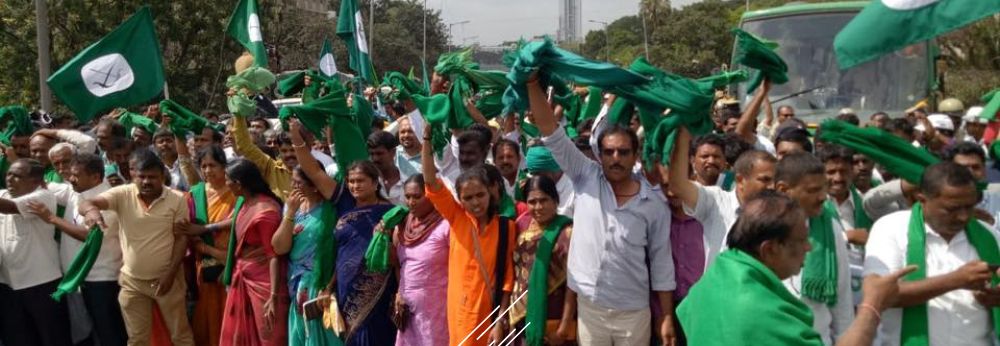The Karnataka Rajya Raitha Sangha – one of the largest peasant unions in South India – has voiced opposition to the decision of the State Biotechnology Coordination Committee to grant a no-objection certificate (NOC) for conducting field trials of MLS 4301 and MLS 2531 transgenic cotton and maize varieties from 2024 to 2026.
This certificate sets the stage for the country’s principal regulatory body, the Genetic Engineering Appraisal Committee, to approve field trials for Rallis India Ltd, a subsidiary of Tata Chemicals. Rallis is involved in the production and marketing of various agricultural inputs, including pesticides, fungicides, insecticides, seeds, and plant growth nutrients.
The commercialization of GM Cotton in 2002 is often cited as a stark reminder of how small-scale farmers lost autonomy over their crops and seeds, leading to increased corporate control over agriculture. In a press release, the KRRS reiterated this concern, highlighting the disappearance of native cotton varieties from traditional cotton-growing areas of Karnataka following the introduction of Bt cotton. They noted that this monopoly has deprived cotton farmers of their freedom to choose their seeds, as they are now reliant on private seed companies every year for sowing seeds.
A 2020 study, which combines data from multiple sources spanning 20 years, concluded that while Bt cotton has effectively controlled one major cotton pest, it has also led to the development of resistance in another pest and increase in populations of non-target pests compelling farmers to spend more on pesticides than they did before the introduction of Bt cotton. This also finds resonance among other experts in India, who argue that Hybrid Bt cotton in India has resulted in a yield plateau, high production costs, and low productivity leading to farmer distress and suicides. Recent studies have also pointed out that the distress is acute among small farmers from historically oppressed communities, where structural and social discrimination coupled with the family’s inability to generate capital has led them to take their own lives.
Peasant unions view the introduction of GM seeds as a means for transnational corporations to gain a foothold in the Indian seed market. The entry of Bt cotton in the 1990s through Monsanto’s equity stake in Mahyco marked the beginning of this trend. Today, Mahyco Monsanto Biotech (India), a joint venture between Monsanto and Maharashtra Hybrid Seeds Co, dominates the commercialization of GM Cotton seeds, sub-licensing technologies to over 45 Indian seed companies.
As per a 2014 data available, nearly 77% of all the GM crops now awaiting trials or commercialization approval within India’s GM regulatory system are from private companies – which includes the likes of Monsanto, Bayer, BASF, Syngenta, Dow Agrosciences and some of their Indian joint venture partners. Most of these experiments extend to crops like Cotton, Maize, Rice, Soybeans, Wheat, and Okra.
India’s peasant unions have long opposed the introduction of GM crops. In 2010, after significant opposition, the Government of India imposed a moratorium on the commercialization and deregulation of Bt Brinjal (egg plant). Concerns about the regulatory framework for GM crops, including the use of antibiotic-resistant marker genes, were raised in a report presented to the Indian Parliament in 2012.
In the context of the NOCs for field trials of GM Maize and Cotton KRRS repeats this concern. “The scientific community at the international level has yet to come to a consensus on transgenic biotechnology. In the last 25 years, international scientists have been expressing concern that the use of genetically modified/transgenic technology in agriculture will have an irreversible negative impact on the health of human beings, animals, birds, and the environment,” the KRRS and Hasiru Sene said and prevailed upon the State government to prevent such field trials.
It is also worth noting that the Supreme Court of India is currently considering a batch of litigation challenging the 2022 decision to commercially release Genetically Modified Mustard (DMH-11) into the environment. Activists who have filed the litigation have raised questions about the flawed regulatory process and the potential environmental and health impacts. Earlier this year, while hearing the arguments, the court also expressed dissatisfaction with the Genetic Engineering Appraisal Committee for not considering the recommendations of a court-appointed expert committee before approving the release of GM mustard.
Cover Image: File photo of a KRRS protest march, used for representative purposes only

